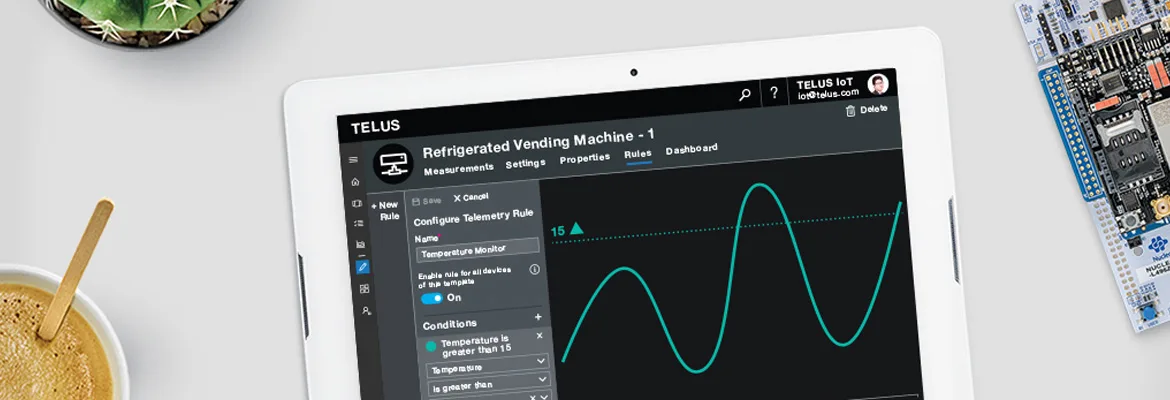IoT Starter Kits designed to make life easier for developers
Tech Trends · Mar 7, 2019
“Just getting an IoT device certified for wireless use in Canada can cost upwards of $30,000,” Aman Kanwar told me when we spoke recently. Aman is the Product Manager for the new TELUS LTE-M Starter Kit, and wireless certification is just one of the issues this kit solves. “Certification takes time too,” Aman said. “The cellular shield we offer is already PTCRB, Industry Canada and TELUS network certified, so that’s a huge time and cost advantage for any developer.”
It’s not the only issue the kit was designed to address. As we talked, it quickly became clear that Aman and his team have a deep understanding of the challenges facing IoT developers, and have done all they can to help them get their solutions to market as quickly as possible. “There are very few organizations that have hardware engineers, software developers and connectivity experts on staff,” Aman explained. “You can probably find them, but it’s time consuming. And then there are still questions about cloud access, finding the right network and more. With the TELUS LTE-M Starter Kit, we set out to solve all these issues and shorten the development timeline.”
Everything you need, built-in or readily available
To make life as easy as possible for developers, the TELUS LTE-M Starter Kit offers a selection of hardware designed to fit almost any IoT solution. It includes:
An STMicroelectronics NUCLEO-L496ZG Development Board clocked at 80 MHz, with 1 MB Flash Memory and 320 KB RAM (for development flexibility). It has multiple expansion interfaces to allow developers almost any combination of components, and it’s supported by comprehensive STM32 free software libraries and examples.
An STMicroelectronics Z-NUCLEO-IKS01A2 Motion and Environmental Sensor Shield, with a 3D Accelerometer, 3D Magnetometer and 3D Gyroscope, as well as a MEMS Pressure Sensor and a relative humidity and temperature sensor.
Avnet’s proven Quectel BG96 module-based LTE Cellular Shield, with added support for GPS and a 2FF SIM connector to accommodate the TELUS Starter SIM that’s included with the kit.
If a developer needs something unique, TELUS has partnered with Avnet. “This means they don’t have to look for components on an electronics site,” Aman said. “They can take advantage of our partnership with Avnet and Avnet’s expertise to source and provide for customized prototyping.”
The kit enables development of embedded application software through the user-friendly Arm® Mbed online IDE, but migration to other software development tools is also supported, including Keil®, IARTMand GCC-based IDEs. “The advanced debugging features within IDEs such as Keil, further mitigates the schedule and cost risks faced by developers and helps ensure new product gets to market as quickly as possible,” Aman told me. “There’s also good support and intellectual property available through the already well developed online forums.”
Freedom of choice now, and later
One key issue for Aman and his team was to make sure that the TELUS Dev Kit doesn’t lock developers into predetermined solutions. “We know that not everyone has the same requirements,” Aman said. “That means we have to give them the flexibility to choose components and partners that are right for their particular solution.”
For example, when it comes to connecting their apps and devices to a Low Power Wide Area (LPWA) network, developers can build and test now on LTE-M, which TELUS launched across Canada in 2018 , and be ready for NB-IoT and firmly on the path to 5G.
Full management support in the cloud
“The Starter Kit can be ordered with SDKs for all major cloud environments, giving developers freedom of choice.” Aman said. “However, we’ve bundled our offering with Microsoft Azure because we share the same philosophy when it comes to working with IoT developers. We’re both invested in helping developers get their solutions to market faster, with less need for a wide range of technical skills. So we’ve enabled accelerated development with Microsoft Azure within the kit.”
As Greg Dashwood, Microsoft’s Product Lead for Internet of Things, points out, “Azure is all about making it simpler, quicker and more effective for developers to get started. Our platform is designed to help solve the challenges of security and scalability, and to simplify the sheer complexity of having multiple devices talking to each other and to the cloud. It’s about providing the capability for developers to get their ideas into code and into a prototype as quickly as possible.”
Ready, set, innovate
The TELUS LTE-M Starter Kit is available now. “TELUS has made the strategic decision to be a catalyst for the IoT ecosystem in Canada,” Aman said. “The Starter Kit is a direct result of that dedication, giving developers a unique tool to help them get to market, whatever they’re creating.”
Visit telus.com/lpwa to learn more about TELUS’ LTE-M low-power wide-area network dedicated to IoT and to order your LTE-M Starter Kit. Come see TELUS at BCTECH Summit in Vancouver March 11-13, 2019. Start-ups from our TELUS Technology Incubator and Accelerator will be showcasing their innovation in our Marketplace booth.



